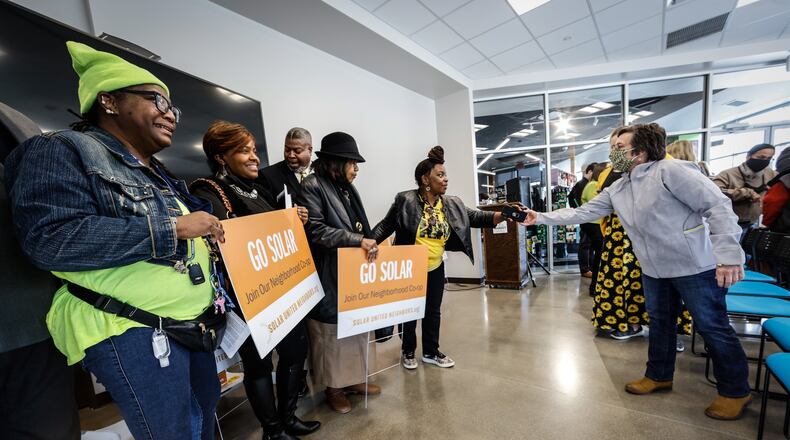Solar arrays can cost between $7,000 and $25,000, depending on individual needs and the size of the home, but co-ops typically are able to save members 10% to 20%, said Tristan Rader, program director of Solar United Neighbors of Ohio.
“The average system size in Ohio is 7 kilowatts and costs anywhere from between $10,000 to $20,000 — it depends on the market,” he said.
Residents and businesses in Butler, Champaign, Clark, Darke, Greene, Miami, Montgomery, Preble and Warren counties can join the Miami Valley solar co-op for free, without a commitment to purchase panels.
The co-op needs about 50 members to move forward with soliciting bids.
Solar United Neighbors has completed 30 solar co-ops across Ohio, helping add solar panels to the rooftops of about 450 homes in the state, said Mryia Williams, program associate with Solar United Neighbors of Ohio.
Solar United Neighbors and its co-op partners in coming months will offer informational sessions to educate community members about the benefits of going solar and the potential to pair it with electric vehicle technology, Williams said.
“Each (member) home will receive a basic roof review with our go-solar team checking to make sure they are a good fit for solar,” said Williams, speaking at the official co-op launch event at the Gem City Market, a cooperative grocery store.
After enough people become members, the co-op will reach out to solar installers and collect bids, and members will vote to choose one company to handle all individual solar projects, with prices based on the negotiated rates, she said.
Solar panels can pay for themselves after roughly nine to 12 years, according to some estimates.
Co-op partners include the city of Dayton, Montgomery County, the Miami Valley Regional Planning Commission and other organizations.
This initiative will help community members decide what kinds of solar energy systems would be most appropriate for their homes, said Montgomery county Commissioner Carolyn Rice, who has solar panels at her home.
“This is an investment — this is a big change — and you want to feel good about it,” she said. “There are so many benefits to this co-op.”
Too many Dayton residents have high electric bills, and the new co-op hopefully will help some people reduce their energy costs, including vulnerable community members, said Dayton City Commissioner Darryl Fairchild.
Solar technology has been prohibitively expensive in the past for some residents, but this co-op should improve access for disadvantaged community members, said Derrick Foward, president of Dayton Unit NAACP, which plans to install panels at its headquarters on Salem Avenue.
“There must be equity in the environmentalmovement,” he said. “Today’s event helps us head down that path.”
About the Author

